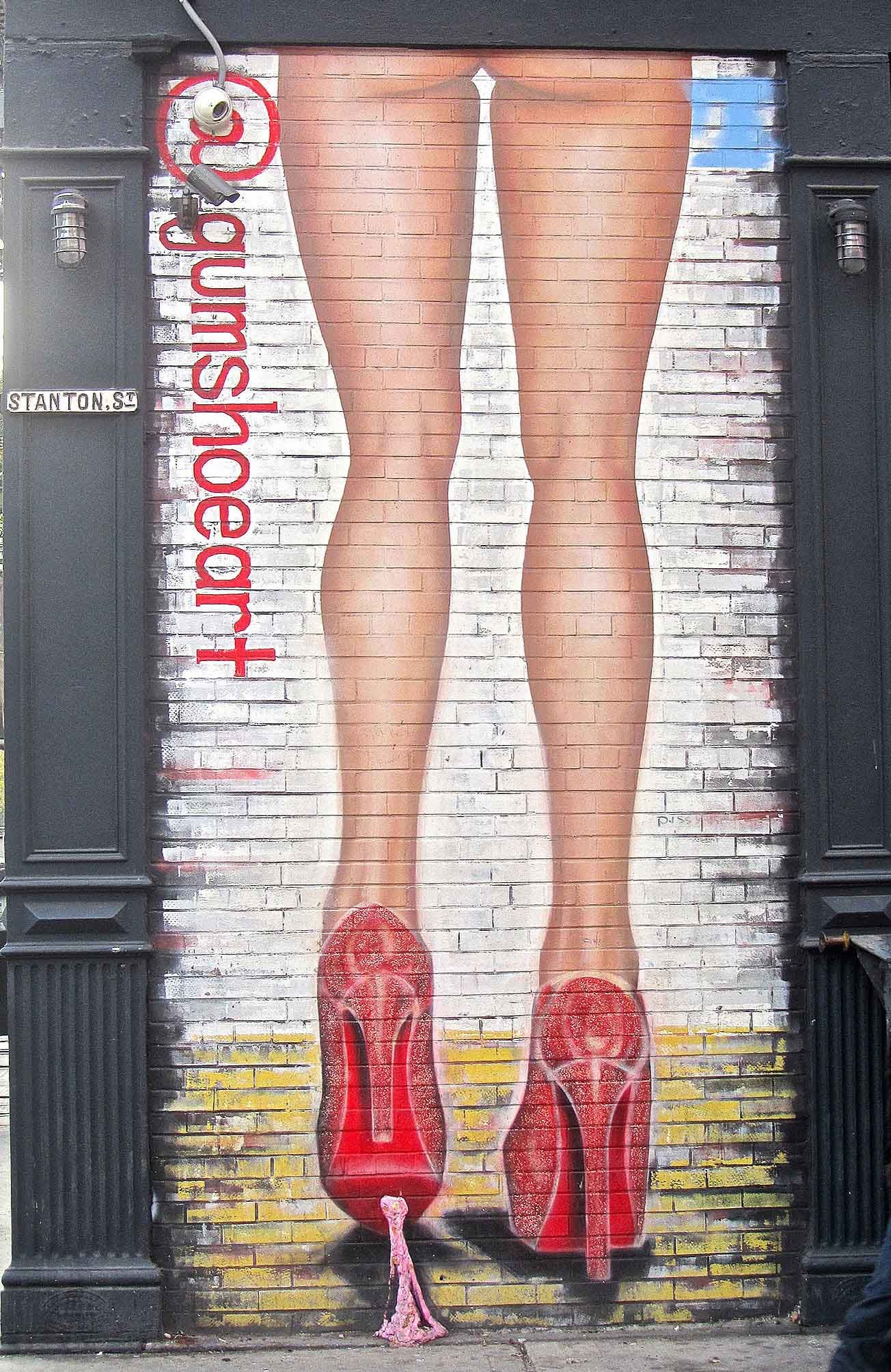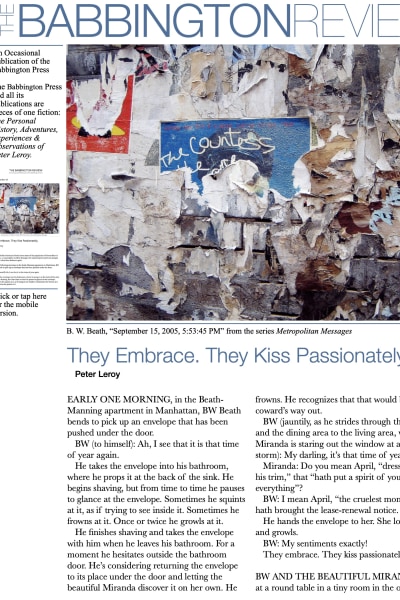EARLY ONE MORNING, in the Beath-Manning apartment in Manhattan, BW Beath bends to pick up an envelope that has been pushed under the door.
BW (to himself): Ah, I see that it is that time of year again.
He takes the envelope into his bathroom, where he props it at the back of the sink. He begins shaving, but from time to time he pauses to glance at the envelope. Sometimes he squints at it, as if trying to see inside it. Sometimes he frowns at it. Once or twice he growls at it.
He finishes shaving and takes the envelope with him when he leaves his bathroom. For a moment he hesitates outside the bathroom door. He’s considering returning the envelope to its place under the door and letting the beautiful Miranda discover it on her own. He frowns. He recognizes that that would be the coward’s way out.
BW (jauntily, as he strides through the kitchen and the dining area to the living area, where Miranda is staring out the window at an ice storm): My darling, it’s that time of year again!
Miranda: Do you mean April, “dressed in all his trim,” that “hath put a spirit of youth in everything”?
BW: I mean April, “the cruelest month,” that hath brought the lease-renewal notice.
He hands the envelope to her. She looks at it and growls.
BW: My sentiments exactly!
They embrace. They kiss passionately.
BW and the beautiful Miranda sit at a round table in a tiny room in the offices of their apartment building’s management team, facing the Property Manager. The building is marketed as a “luxury building.” The laminated surface of the table is lifting off in two places. The chairs around it do not match.
Property Manager (tenting his fingers and assuming the tone of a veterinarian who is about to recommend putting Frisky down): I’m afraid there is nothing I can do about the rent increase. My hands are tied.
Miranda (sotto voce): If only.
Property Manager: Ms. Manning?
Miranda: Can you at least do something about the noise in the gym?
Property Manager: Ah! I received your email about that. You asked us to turn the radio down. (He pauses.) Other people have asked us to make it louder!
Miranda (after a moment of stunned silence): Could you at least play different music?
Property Manager (with a false smile meant to suggest magnanimity): What would you like?
Miranda: Bach.
Property Manager (after taking his turn at a moment of stunned silence): Oh—that’s a good one! You had me going there for a minute. Bach! In a gym! You’ve got a sense of humor! (rising to indicate that as far as he’s concerned the meeting is over) Bach! In a gym!
BW and Miranda leave the Joyce Theater after seeing the Lar Lubovich Dance Company perform “Little Rhapsodies,” a portion of “Othello,” “Something About Night,” and “Men’s Stories.” They begin walking on Eighth Avenue.
Miranda: The idiot who reviewed them for the Times should be turned out to pasture and left there until he is a little pile of dust.
BW: Along with the idiot a few places to my right who kept turning a phone on and off.
Miranda: I didn’t notice that.
BW: And I didn’t read the review.
Miranda: No one should have. Basically, the egotistical little shit declared that Lubovich’s “fine craftsmanship,” the “technical finesse of the company’s excellent dancers,” and the “attractive” style of the choreography, failed to earn his respect.
BW: Really? Why? Was he blinded by the bright light of someone’s phone?
Miranda: He was blinded by the bright light of self-love. He actually admitted that he wasn’t capable of explaining what he thought was wrong except that the work “made little impression” on him, because he wanted “something more,” or “something else.”
BW (in the voice of a whining child): “The work should have been made for me, just for me, and I’m damned annoyed that it wasn’t.”
Miranda murmurs inaudibly.
BW: Was that a curse, hex, or malediction?
Miranda: Yes, it was.
Miranda and BW hear the Vera Quartet play works by Haydn, Adès, and Britten at the New School’s auditorium on West 12th Street, as part of the Schneider concert series.
They join the rest of the aged audience in enthusiastic applause. As an encore, the players give Joaquín Turina’s “La Oración del Torero” (“The Bullfighter’s Prayer”).
Afterward, during their walk toward midtown, to get buradi rolls at Biryani Cart, BW is unusually silent. Miranda is ebullient.
Miranda: There are times when I’m glad I’m alive, and today is one of them. I love the young players we hear here, and I love the young students who are revolting against the culture of violence, and—what’s wrong?
BW: At the end of the bullfighter’s prayer, what did you hear?
Miranda (thinking that this may be a joke): Two violins, a viola, and a cello.
BW: I mean, what did the final strains say to you?
Miranda (still expecting a joke): What did they say to you?
BW: “Memento mori.”
Miranda: Ah. I see. Well, I think I heard “Carpe diem.”
BW: Two sides of the same coin?
Miranda (no longer expecting a joke, drawing him near): Perhaps.
The question was, What to write about? . . . I had read that one writes because one has something to say. I could not see that I had anything to say except that I was alive.
V. S. Pritchett, Midnight Oil
Our own experience provides the basic material for our imagination, whose range is therefore limited. It will not help to try to imagine that one has webbing on one’s arms, which enables one to fly around at dusk and dawn catching insects in one’s mouth; . . . and that one spends the day hanging upside down by one’s feet in an attic. In so far as I can imagine this (which is not very far), it tells me only what it would be like for me to behave as a bat behaves. But that is not the question. I want to know what it is like for a bat to be a bat.
Thomas Nagel, “What Is It Like to Be a Bat?” (1974)
BW and Miranda are shivering. For the third morning in a row, their apartment has no heat.
Building maintenance has notified them that there is “a problem” with “the boiler.” Maintenance assures them that they have had “a vendor” in to look it over.
BW: Apparently, looking it over hasn’t solved the problem.
Miranda: I want to get out of here.
BW: Move?
Miranda: Possibly, but right now I’ll settle for a visit to a nice warm supermarket.
BW: Oh. Shopping.
Miranda: I’m afraid so. We need things.
As they cross the lobby, their progress is interrupted by a fellow tenant whom I will call Christopher, because that is not his name, and his privacy ought to be respected, I think.
Christopher (stepping in front of them, flashing a smile): Do you think I could fly an airplane?
Miranda: We’re on an urgent errand, Christopher.
Christopher: Just tell me—do you think I could fly an airplane? A big one? For a major airline?
Miranda (squeezing gracefully past him): Possibly, but not one that I was on.
Christopher: Why do you say that?
Miranda: Christopher, I think you’re a nice man, but I would not be on a plane that you were going to fly.
He always liked to spread his meals out, to make them last longer. A drink of water to wash the food down, and he returned to the middle of the cage, where he proceeded to conduct a few intimate researches with his beak under his left wing. After which he mewed like a cat, and relapsed into silent meditation once more. He closed his eyes and pondered on his favourite problem—Why was he a parrot?
P. G. Wodehouse, Jill the Reckless
The problem of other minds is the problem of how to justify the almost universal belief that others have minds very like our own.
Stanford Encyclopedia of Philosophy (Spring 2016 Edition)
BW and Miranda have had an excellent lunch at Pera Mediterranean Grill on Madison Avenue.
Miranda pays the check. She adds a twenty percent tip. The waiter collects the completed paperwork. He smiles at them both, leans toward them, and speaks in a lower-than-usual voice.
Waiter: Thank you. It was good to see you. You’re nice people.
He leaves. Miranda watches him go. She turns to BW, shaking her head.
Miranda: That was depressing.
BW: It certainly was. “Nice people”? Outrageous. Egg salad on white bread: nice sandwich.
Miranda: I don’t mean that. I don’t mind being seen as a nice person. I think I am a nice person.
BW: Then what was depressing about it?
Miranda: If he was spontaneously inspired to tell us that we’re “nice people,” think of all the shits he must have to deal with every day.
BW: Oh.
Miranda: Doesn’t that thought depress you?
BW: It does now.
BW and Miranda are in the kitchen of their apartment. They are in the process of making dinner. BW opens the oven door to check the roasting progress of a pork loin coated with cracked peppercorns. Miranda is flash-frying shishito peppers in a large pan on the stovetop.
The smoke detector in the hallway adjacent to the kitchen begins screaming at them. The one in the den joins it. The one in the guest bedroom does, too.
For a moment, Miranda and BW seem startled. Then they sigh in unison.
BW: I should have disconnected them before we began. It may interest you to know that a man in Barton, Vermont, annoyed by frequent false alarms from the smoke detector in the kitchen of his apartment, “disarmed” it with two shots from a 20-gauge shotgun.
Miranda (slowly, thoughtfully): How much does a shotgun cost?
BW (from a step stool, while ripping a smoke detector from its mounting bracket): That depends. I discovered that they come in many sizes and configurations. The 12-gauge models seem to be most widely used by hunters. The 20-gauge used by your hero up in Barton, Vermont, is a lighter gun, and apparently less powerful, despite the higher gauge number. I found an H&R 1871 Pardner Pump Youth Model 20-gauge online for $160.82 and a Charles Daly 101 Single Barrel Break Action 12-gauge for $163.14. Of course, there would be shipping, and tax, and we’d need ammunition.
Miranda (narrowing her eyes, contemplating the smoke detector): I might want a 12-gauge.
BW: I can understand that, but my research leads me to conclude that a 12-gauge would be—
Miranda (after a moment): I’m waiting for it.
BW: Overkill.
They embrace. They kiss passionately.
The Babbington Press and all its publications are pieces of one fiction: The Personal History, Adventures, Experiences & Observations of Peter Leroy.
You can begin reading the Personal History at the beginning or you can catch up by visiting the archive or consulting the index to the Topical Guide.
You can listen to the episodes on the Personal History podcast. Begin at the beginning or scroll through the episodes to find what you’ve missed.
You can ensure that you never miss a future episode by getting a free subscription. (You can help support the work by choosing a paid subscription instead.)
At Apple Books you can download free eBooks of “My Mother Takes a Tumble,” “Do Clams Bite?,” “Life on the Bolotomy,” “The Static of the Spheres,” “The Fox and the Clam,” “The Girl with the White Fur Muff,” “Take the Long Way Home,” “Call Me Larry,” and “The Young Tars,” the nine novellas in Little Follies, and Little Follies itself, which will give you all the novellas in one handy package.
You’ll find overviews of the entire work in An Introduction to The Personal History, Adventures, Experiences & Observations of Peter Leroy (a pdf document) and at Encyclopedia.com.













